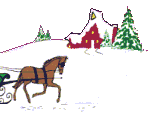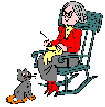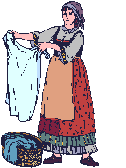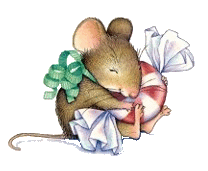

The Village Has an Election
The 2015 Christmas mantel. For closeups, click on the Church and each of the twelve
houses.

For a widescreen version of this mantel village, click here.
Albert Pittman has had a good long run as mayor of the village. He has enjoyed the job, and the citizens have appreciated the job he's been doing. The village has become a little less sleepy in the past few years, and all because of the Mayor's drive and ambition. There was that Grand Parade for everyone to see; there is an upgraded hospital for everyone to use; there are lavish balls for everyone -- well, the upper crust, anyway -- to enjoy. All in all, a satisfied electorate had planned to vote Mayor Pittman right back into office.
 But the mayor has another, greater ambition: he has become a candidate for the United States Senate. A village mayor leapfrogging into the United States Senate? The very notion has a few villagers snickering, but most are enthusiastic. Albert Pittman can do anything he sets his mind to, they say, especially with his wife's wealth behind him. What an honor for a small village to produce a senator of the United States of America! Why, before you knew it, he could be the President of the United States of America!
But the mayor has another, greater ambition: he has become a candidate for the United States Senate. A village mayor leapfrogging into the United States Senate? The very notion has a few villagers snickering, but most are enthusiastic. Albert Pittman can do anything he sets his mind to, they say, especially with his wife's wealth behind him. What an honor for a small village to produce a senator of the United States of America! Why, before you knew it, he could be the President of the United States of America!
How to Build a Snowman (Houses 1, 2, 3, 4):
Dorothea Sparks, nestled under a heavy blue blanket in her sleek carriage, has no such qualms about either the banker or the mayor. She will never need a loan from the bank -- no possible hard feelings there -- and she is genuinely curious to see just how far the mayor can climb. She wonders: was running for the Senate his idea, or was it his wife Lavinia's? One thing seems certain: if the Pittmans end up in Washington, D.C., then Dorothea will have the social scene in the village to claim for her own. The only thing is, does she care enough to want it? She laughs at the thought and tells her young and handsome driver, "Faster, please! We don't want to miss the rally!"
Uh-oh.
Behind the mayor, the musicians have been playing lively, merry tunes, all the better to get the crowd fired up. And they are, although the Woodcuts, tired of standing, have decided to take a short break. Stacking their hand-made signs against their bench, they rest their weary legs and sip strong tea fortified with a spot of brandy. "I reckon he'll speak any minute now," Mr. Woodcut ventures. "This should be good. Do you think he has a chance, missus?"
His wife, by far the wiser of the two, shrugs. "A chance, yes. But do we really want him to leave the village? He can do so much more for us here than he would be able to do down in Washington, D.C."
Saucy, pretty Alice, standing next to Mr. Woodcut, leans down to whisper in his ear, "I've heard that Mrs. Pettifore would like her husband to run for mayor if Mayor Pittman does get elected to the Senate."
Mr. Woodcut immediately passes the rumor on to his wife. The three of them stare at the back of Mrs. Pettifore, standing just in front of them with her daughter Eloise, and try to divine whether the woman really has ambitions for her attorney husband.
"No. I do not see it," says Mrs. Woodcut at last. "She would not want to share him with the public at large. She does like to keep her family tight-knit. Ah! Look who's here. How goes the battle, Mr. MacGowan?"
"Still swingin'," old man MaGowan says, approaching them. With a sigh of exasperation, he adds, "I been told to carry this dang sign, but my dang arthritis has other ideas. I strapped it to my wrist, but now it hurts worse. Alls I can say is, there better be something in this fer me at the end of the day."
"Well, in the meantime, hand me your sign and your cane and take a load off, sir," Mrs. Woodcut tells him, patting the bench beside her. "And how is your cat?" she adds, knowing how fond he has become of the stray he's taken in.
"But so would you, Mr. MacGowan, and you wouldn't like that," Alice teases. Suddenly her voice turns soft. "Oh. Johnny Hooks ... over there. With his new wife Sonja. Oh, that's hard to see." Her lashes flutter down and she looks away.
Mrs. Woodcut, like everyone else in the village, knows that Johnny and Alice were briefly an item. But it was always Sonja that Johnny loved, whether the lad realized it all the time or not. Now he did. You could see it in the way he had his arm protectively around her. "What a slip of a thing Sonja is," Mrs. Woodcut exclaims. "She so tiny ... he so brawny. What an odd and yet delightful pair they make."
"Yes. They do," Alice admits with a sigh. "Oh well."
Her husband smiles. "It is no small thing to leave a life in Canada for one in New England. But now that she is widowed, I am the only family Aunt Agatha has. She does seem to dote on the children," he adds.
"Because she has none of her own? Could that be the reason? Or is it just that she's a loving person -- as well as a perfect fit for our family?"
Will shrugs and says,"Probably a combination." He's struck anew by how far he has traveled along the path to fulfillment. He's gone from being a lonely bachelor to finding his soul mate, having two beautiful children with her, and now having an aunt he hasn't seen since he was a child come live with them. Family! It's all so much more than he ever could have dreamed.
The carriage of the mayor's wife Lavinia is struggling to make its way through the crowd, adding to Lavinia's stress. She is of mixed mind regarding her husband's campaign. If he succeeds, he will have gained access to the truly glittering society of the nation's capital. If he fails, then they will remain in the village, but as political failures. She wonders whether her philanthropy can trump a poor performance.
Probably, she decides. Money does talk, after all. "Driver! For pity's sake, can you not make the crowd move aside?"
Sam puts his nose to the air and sniffs. "Ooh, yes to that. They must be layin' out the food. Maybe we can finagle a bite before we goes off. I'll see what I can do with Florrie."
Eddy rubs his hands in anticipation. "She's a good cook, is Florrie. Don't know why old man MacGowan ain't asked for her hand yet. The man would eat like a king."
"You make a good point, Eddy. You know what? If he don't ask her, maybe I will! Ha!"
She is surprised to see the child standing in the cold on her front porch, clutching a doll. "Oh, hello June, dear --"
"Shh-h-h!" whispers little June as Miss Martha approaches. "You mustn't frighten her! Shh-h."
Martha turns to see a sweet fawn bedded down nearby. "Oh. I see," she whispers back. "Is there a deer run that goes somewhere from here?"
"I don't think she would hurt the fawn, do you?" little June asks in an earnest tone.
(But just in case, eight distant cousins are flying close overhead to look over the fawn, deciding that ... yes, she is doing just fine.)
Trotting in front of his new master and mistress, Boots shows every sign of being with people he loves. It's true that they're a bit slower than the usual flock of sheep he controls, but at least they go more or less in a straight line. He does his best to herd them along more quickly. Rof rof, he cajoles. Move along, move along now.
"We are going as fast as we can, you scamp!" cries Mrs. Jack Jones with a laugh. She is completely in love with the lively and loyal dog. What energy! If only she had a fraction of it! Her husband points out that Boots is a working dog, doing what he knows best. "And at least he does settle down at night, by the fire," he adds a little gruffly, masking his own fondness for the animal. "I reckon we can keep 'im."
Rof! Rof!
And so another year in the village has come and gone, with its usual mix of small pleasures and big surprises; broken hearts and mended fences;
the newly born and the dearly departed -- all woven together in the multi-hued tapestry that we call life.


 Mayor Pittman's campaign manager, banker Max Schurster, knows that for a political rally to be a success, it must provide amusements for the voters' children. Mothers and fathers will not stay long if their little ones become bored and start to whimper and beg to go home. And so he has instructed his assistants to find fun things to do for them. Mickey Sullivan, an ex-child himself and now a hard-working, self-described "ontoorpenoor," is in charge of Youth Activities. His plan is simple: roll a few miniature snowmen and have the children decorate them. (It's easier than having, say, to bake cookies for them to frost.) With some carrots from his family's root cellar and some coal from their bin, he has all he needs to conduct a class in the art of bringing a snowman to life. The children, seated on benches, are enthralled. After the snowmen are decorated -- and if the rally is still going strong -- they might even get to build an igloo with Mickey. "If that ain't enough fun, what is?" Mickey says to his helpers. (One of them is his cousin Big Billy, who is thrilled to be solely in charge of the carrots and coal, even if he isn't exactly getting paid.)
Mayor Pittman's campaign manager, banker Max Schurster, knows that for a political rally to be a success, it must provide amusements for the voters' children. Mothers and fathers will not stay long if their little ones become bored and start to whimper and beg to go home. And so he has instructed his assistants to find fun things to do for them. Mickey Sullivan, an ex-child himself and now a hard-working, self-described "ontoorpenoor," is in charge of Youth Activities. His plan is simple: roll a few miniature snowmen and have the children decorate them. (It's easier than having, say, to bake cookies for them to frost.) With some carrots from his family's root cellar and some coal from their bin, he has all he needs to conduct a class in the art of bringing a snowman to life. The children, seated on benches, are enthralled. After the snowmen are decorated -- and if the rally is still going strong -- they might even get to build an igloo with Mickey. "If that ain't enough fun, what is?" Mickey says to his helpers. (One of them is his cousin Big Billy, who is thrilled to be solely in charge of the carrots and coal, even if he isn't exactly getting paid.)
 If the children were just a little older or a little taller, they would be able to ride behind old farmer Hooks, who has been hired by the Pittman campaign to ferry youngsters back and forth over the snow. He's done it before, but this time it's harder. He's old, his horse is old, and besides everything else, now Farmer Hooks has to keep a sign held to his sled. "Vote!" it implores. Well, the farmer means to do that -- but it won't be for Al Pittman. John Hooks is still simmering over a loan that was once denied him by banker Schurster, who happens to be managing the election campaign for his pal the mayor. "Yer known by the company ye keep," Hooks has told his son Johnny and his daughter-in-law Sonja. "Birds of a feather," he likes to mutter darkly.
If the children were just a little older or a little taller, they would be able to ride behind old farmer Hooks, who has been hired by the Pittman campaign to ferry youngsters back and forth over the snow. He's done it before, but this time it's harder. He's old, his horse is old, and besides everything else, now Farmer Hooks has to keep a sign held to his sled. "Vote!" it implores. Well, the farmer means to do that -- but it won't be for Al Pittman. John Hooks is still simmering over a loan that was once denied him by banker Schurster, who happens to be managing the election campaign for his pal the mayor. "Yer known by the company ye keep," Hooks has told his son Johnny and his daughter-in-law Sonja. "Birds of a feather," he likes to mutter darkly.
The Next New House (House 5):
 Well, Clyde and Margaret are at it again: buying another house. Some people just like to buy and sell houses, and this lucky couple has no reason to stop; every house they've ever sold has made them money. The house they have just acquired isn't really one that they will live in (it's too small to accommodate their family and the nanny), but it was bought after a foreclosure and at an irresistible price. Clyde plans to rent it out. Margaret thinks that's embarrassing. Clyde doesn't understand why. Margaret doesn't want to be known as a "landlady." Clyde thinks his wife is being a bit shallow and foolish in the matter. Margaret doesn't care what he thinks.
Well, Clyde and Margaret are at it again: buying another house. Some people just like to buy and sell houses, and this lucky couple has no reason to stop; every house they've ever sold has made them money. The house they have just acquired isn't really one that they will live in (it's too small to accommodate their family and the nanny), but it was bought after a foreclosure and at an irresistible price. Clyde plans to rent it out. Margaret thinks that's embarrassing. Clyde doesn't understand why. Margaret doesn't want to be known as a "landlady." Clyde thinks his wife is being a bit shallow and foolish in the matter. Margaret doesn't care what he thinks.
 The Election Rally (Houses 5, 6 and 7 ):
The Election Rally (Houses 5, 6 and 7 ):
"Excellent turnout, Max, excellent." From his perch above the crowd, Mayor Pittman scans the faces below him: just about everyone in the village is there. His sees his wife's carriage approaching from one direction, Dorothea Sparks's carriage from the opposite. Thank goodness for that. The last thing he needs right now is a chariot race between them!

 Turning to the banker, he asks whether the reception hall is ready. "Yes indeed," Max assures him. "Sam should have the entry swept of snow by now, and food should be inside at the ready. Hot cider, roasted fowl, cakes, cookies -- that should bring them in. You will be able to move among your constituency with handshakes and back slaps, nailing down their votes."
Turning to the banker, he asks whether the reception hall is ready. "Yes indeed," Max assures him. "Sam should have the entry swept of snow by now, and food should be inside at the ready. Hot cider, roasted fowl, cakes, cookies -- that should bring them in. You will be able to move among your constituency with handshakes and back slaps, nailing down their votes."
 "You've done well, my friend," the mayor says. "I hope that my speech is equal to your preparations." Truth be told, the mayor has a case of butterflies. It is one thing to run for mayor of a town of six hundred, another to go up against a long-time incumbent who lives in the state's capital. Even with Lavinia's financial support, Albert Pittman finds himself a definite David to his opponent's Goliath. Still, if he does manage somehow to get elected, he is absolutely certain that he can make a difference. Some people ran for their own personal ambition. Albert Pittman was running because, well, because he believed in the American Dream. Every single person deserved a chance to better himself and move up in life. It was really that simple.
"You've done well, my friend," the mayor says. "I hope that my speech is equal to your preparations." Truth be told, the mayor has a case of butterflies. It is one thing to run for mayor of a town of six hundred, another to go up against a long-time incumbent who lives in the state's capital. Even with Lavinia's financial support, Albert Pittman finds himself a definite David to his opponent's Goliath. Still, if he does manage somehow to get elected, he is absolutely certain that he can make a difference. Some people ran for their own personal ambition. Albert Pittman was running because, well, because he believed in the American Dream. Every single person deserved a chance to better himself and move up in life. It was really that simple.
 "Aye, you're not the only one believes that. The boys down at Sully's Pub think so, too. Still, it's good policy to show support and be noticed by hizzoner. Once we pull the curtain in the voting booth -- well, we can vote any way we want, can't we. This is America."
"Aye, you're not the only one believes that. The boys down at Sully's Pub think so, too. Still, it's good policy to show support and be noticed by hizzoner. Once we pull the curtain in the voting booth -- well, we can vote any way we want, can't we. This is America."
 "Roamin' again," he answers. He sounds a little hurt. "She always comes back, but I don't make it easy for her, movin' from place to place the way I do. Maybe I should take up livin' in the lighthouse again. At least the little hussy would have to stay put."
"Roamin' again," he answers. He sounds a little hurt. "She always comes back, but I don't make it easy for her, movin' from place to place the way I do. Maybe I should take up livin' in the lighthouse again. At least the little hussy would have to stay put."
 Will and Harmony are also among the crowd, though neither is holding a placard. They are happy simply to be out and about, just the two of them. They love their children fiercely, but it's still a treat to be the sole focus of one another's attention. "How lucky we are that your aunt has come to live with us," Harmony says, not for the first time.
Will and Harmony are also among the crowd, though neither is holding a placard. They are happy simply to be out and about, just the two of them. They love their children fiercely, but it's still a treat to be the sole focus of one another's attention. "How lucky we are that your aunt has come to live with us," Harmony says, not for the first time.
 One other couple is nearly as happy as Will and Harmony. Grace Newcomb Greene, midwife and now doctor's wife, pauses near the iron fence in search of her husband. Doctor Nicholas Greene has tried not to become involved in his old college mate's run for U.S. Senator, but that's proved hard to do. Grace has never been fond of political maneuvering and was secretly happy that her husband declined to be Albert Pittman's actual campaign manager, but he'll still be an adviser. His advice will always be worth taking; no one knows that more than Grace. She spies him at last, conversing with the men clustered near the mayor while they await the big speech. Grace's heart lifts, as it always does when she sees him. I do love you, she thinks, beaming that message to him over the crowd.
One other couple is nearly as happy as Will and Harmony. Grace Newcomb Greene, midwife and now doctor's wife, pauses near the iron fence in search of her husband. Doctor Nicholas Greene has tried not to become involved in his old college mate's run for U.S. Senator, but that's proved hard to do. Grace has never been fond of political maneuvering and was secretly happy that her husband declined to be Albert Pittman's actual campaign manager, but he'll still be an adviser. His advice will always be worth taking; no one knows that more than Grace. She spies him at last, conversing with the men clustered near the mayor while they await the big speech. Grace's heart lifts, as it always does when she sees him. I do love you, she thinks, beaming that message to him over the crowd.
 The church, right now, is a quiet place. Within, a few elderly parishioners silently offer up prayers: for a cure, for continuing health, for someone they care about to see the light. They do not hear the buzzing crowd nearby, nor do they realize why so many have gathered on the town square. An election has little importance for them.
The church, right now, is a quiet place. Within, a few elderly parishioners silently offer up prayers: for a cure, for continuing health, for someone they care about to see the light. They do not hear the buzzing crowd nearby, nor do they realize why so many have gathered on the town square. An election has little importance for them.
 Just outside the entry to the church, Mildred and Joanna are making a valiant effort to practice a new hymn. It would be easier to practice inside -- no competition from the mayor's band nearby -- but the two friends do not want to rely on the interior's wonderful acoustics to make their initial effort sound better than it is. No, it's better to learn the hard way: outside. They do have the help of a violinist who has sneaked away from the rest of his band nearby. But he can't stay long, and after he leaves, Mildred and Joanna will have to rely on a pitch-pipe.
Just outside the entry to the church, Mildred and Joanna are making a valiant effort to practice a new hymn. It would be easier to practice inside -- no competition from the mayor's band nearby -- but the two friends do not want to rely on the interior's wonderful acoustics to make their initial effort sound better than it is. No, it's better to learn the hard way: outside. They do have the help of a violinist who has sneaked away from the rest of his band nearby. But he can't stay long, and after he leaves, Mildred and Joanna will have to rely on a pitch-pipe.
The Reception Hall (House 9):
 Samuel Rickens is just finishing up sweeping the last of yesterday's snow from the entryway. Christmas is still weeks away, but judging from the frequent snowfalls, it surely will be a white one. "John Hooks was hoping to use his wagon to haul the young 'uns around today -- but no, it's the sled he's had to hitch his nag to," Sam explains to his pal Eddy. "That was more work, plus now he has to be watching for bare spots."
Samuel Rickens is just finishing up sweeping the last of yesterday's snow from the entryway. Christmas is still weeks away, but judging from the frequent snowfalls, it surely will be a white one. "John Hooks was hoping to use his wagon to haul the young 'uns around today -- but no, it's the sled he's had to hitch his nag to," Sam explains to his pal Eddy. "That was more work, plus now he has to be watching for bare spots."
Eddy is bent over, pulling up one of his socks. For whatever reason, the one sock likes to crawl; it's a constant annoyance to him. "We'd better get a move on and get over to that rally," he tells Sam. "Our signs ain't doin' much good leanin' against this building. Hey, do I smell chicken?"
The Joneses Have a Visitor (House 10):
 Mrs. Appleby is a very distant cousin of Jack Jones, and she has known Mrs. Jack Jones since she was just Miss Bates. Mrs. Appleby's life has not been easy: taking in laundry has always been hard work, but at her advancing age, the job has become more of a strain than ever. Her back! It sometimes seems to Mrs. Appleby that she will never be able to stand straight again. And yet here she is, pulling a load of dirty laundry that she has collected from one of the better houses in the village (but one that is not grand enough to have their own laundress). It's a heavy load, and Mrs. Appleby is in the neighborhood, so she has the idea of stopping by the Joneses for perhaps a cup of tea and a chance to catch her breath. But she is disappointed; the Joneses are not home. She will have to continue on her way without that longed-for rest.
Mrs. Appleby is a very distant cousin of Jack Jones, and she has known Mrs. Jack Jones since she was just Miss Bates. Mrs. Appleby's life has not been easy: taking in laundry has always been hard work, but at her advancing age, the job has become more of a strain than ever. Her back! It sometimes seems to Mrs. Appleby that she will never be able to stand straight again. And yet here she is, pulling a load of dirty laundry that she has collected from one of the better houses in the village (but one that is not grand enough to have their own laundress). It's a heavy load, and Mrs. Appleby is in the neighborhood, so she has the idea of stopping by the Joneses for perhaps a cup of tea and a chance to catch her breath. But she is disappointed; the Joneses are not home. She will have to continue on her way without that longed-for rest.
The Very Last One at the Rally (House 11):
She was late. Of course. Does she care? Of course not. She hadn't planned to attend the rally in the first place. Why encourage such folly? Albert Pittman was never going to be elected a United States Senator. You could take that to the bank. He had enthusiasm, yes; charm, yes; a wife with money, yes. But the odds against him were absurd. Senator Halfort was a wildly popular incumbent who was not about to be unseated, despite that silly little allegation about a bribe. Those are the thoughts going through Eunice Pittman's head as she tucks her hands more snugly into her ermine muff and considers the foolish path her son has chosen to take. His idealism was most annoying, a thorough waste of time. He was always doing that -- trying to make a difference. Why couldn't he be more like his older brother, who knew so much better how to play the game; who knew when to say what to whom, instead of always trying to speak plain truth? Where, after all, was the truth going to get Albert?
Most annoying.
A Kinder, Gentler Moment (Houses 12 and 13):
 Miss Martha, as she is known to the village children, has decided to make handing out peppermint balls to the youngsters an annual treat. Last year, the wave of influenza that washed over the village washed over poor Santa Claus as well; there were no candies dispersed by him at City Hall, as had been the tradition. That's when Martha stepped into the gap with her home-made peppermint balls, bringing joy to the little ones' faces. This year, all were well in the village and the children would surely have their usual candies from Santa at City Hall -- but Martha was so pleased with the responses she got the year before that she decided to carry on anyway. So, armed with a basket of candies, she's made the rounds of the village, finishing up at little June's house. It's still weeks away from Christmas, but the candies will set the mood for the season and will surely be enjoyed by all.
Miss Martha, as she is known to the village children, has decided to make handing out peppermint balls to the youngsters an annual treat. Last year, the wave of influenza that washed over the village washed over poor Santa Claus as well; there were no candies dispersed by him at City Hall, as had been the tradition. That's when Martha stepped into the gap with her home-made peppermint balls, bringing joy to the little ones' faces. This year, all were well in the village and the children would surely have their usual candies from Santa at City Hall -- but Martha was so pleased with the responses she got the year before that she decided to carry on anyway. So, armed with a basket of candies, she's made the rounds of the village, finishing up at little June's house. It's still weeks away from Christmas, but the candies will set the mood for the season and will surely be enjoyed by all.
 The child nods gravely and says, "It goes to a deer yard in the pine trees behind us. There are bucks and does and fawns there. But this fawn is a little bit hurt. Not a lot, my daddy says. Her mama comes to check on her all the time. My daddy says that she's going to be fine. That's what my daddy says. But I'm making sure that Mrs. Jones's new dog doesn't come too near," she explains, pointing down the lane. "Is that your cat?" the girl adds, eyes narrowing.
The child nods gravely and says, "It goes to a deer yard in the pine trees behind us. There are bucks and does and fawns there. But this fawn is a little bit hurt. Not a lot, my daddy says. Her mama comes to check on her all the time. My daddy says that she's going to be fine. That's what my daddy says. But I'm making sure that Mrs. Jones's new dog doesn't come too near," she explains, pointing down the lane. "Is that your cat?" the girl adds, eyes narrowing.
.gif) The cat at Martha's side has appeared out of nowhere. "No-o, but I've seen her some-- I know! She's Mr. MacGowan's cat."
The cat at Martha's side has appeared out of nowhere. "No-o, but I've seen her some-- I know! She's Mr. MacGowan's cat."
 "I'm sure not," says Miss Martha, smiling. "The fawn will be just fine."
"I'm sure not," says Miss Martha, smiling. "The fawn will be just fine."
Mr. and Mrs. Jones Have a New Dog (House 13):
By a lucky stroke of serendipity, not long ago pretty Alice happened to run into Lucas, the village shepherd, just as he was trying to bring his wandering sheep dog Boots to heel. With only one working eye, poor Boots was no longer much good at shepherding, but he had a wonderful personality and was as friendly a dog as anyone could wish to see.
 Alice instantly thought of Mrs. Jack Jones and remembered how sorrowful the woman still was after losing her inseparable companion Rusty. Boots and Mrs. Jack Jones could be a match made in heaven, Alice told the shepherd. And she was right. Without losing a smidge of love for her departed dog Rusty, Mrs. Jack Jones instantly made room in her heart for the friendly, frisky sheep dog Boots.
Alice instantly thought of Mrs. Jack Jones and remembered how sorrowful the woman still was after losing her inseparable companion Rusty. Boots and Mrs. Jack Jones could be a match made in heaven, Alice told the shepherd. And she was right. Without losing a smidge of love for her departed dog Rusty, Mrs. Jack Jones instantly made room in her heart for the friendly, frisky sheep dog Boots.
For earlier chapters of this Christmas tale, click on the links to previous mantels: